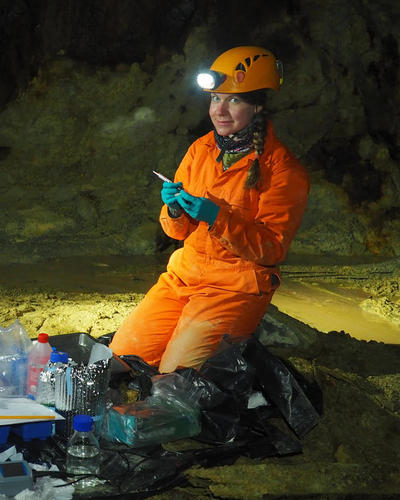Petra Hribovšek
- E-mailpetra.hribovsek@uib.no
- Visitor AddressRealfagbygget, Allégaten 415020 BergenRoom4F14d - 4130a
- Postal AddressPostboks 78035020 Bergen
I am a PhD candidate in microbial ecology at the Center for Deep Sea Research at the University of Bergen. My research involves studying recently discovered groups of bacteria and archaea that inhabit hydrothermal vent systems. In my work, I utilize a combination of genome-resolved metagenomics and microscopy techniques to gain a better understanding of these microorganisms.
--------------------------------------
PhD project: Investigating the ecology, evolution and metabolism of uncultivated deep-sea hydrothermal microbial lineages
Deep-sea hydrothermal vents support a diversity of archaea and bacteria. Studying these organisms can provide important insights into topics such as biodiversity, element cycling, the evolution of life, and bioprospecting. In my doctoral project, I aim to contribute to our understanding of the ecology, evolution, and metabolic diversity of these largely uncultivated groups of microorganisms at deep sea hydrothermal vents. To accomplish this, I use a variety of techniques including genome-resolved metagenomics, phylogenomics, bioinformatics analyses, and microscopy methods such as FISH, scanning electron microscopy, and helium ion microscopy. I analyze samples collected from diverse hydrothermal vent environments across the Arctic Mid-Ocean Ridge, using sequences generated with Illumina and Nanopore sequencing. My current research focus is on iron-oxidizing bacteria found in hydrothermal vents.
A member of the Deep-sea biology research group
GEOV245 Geomicrobiology
- (2023). Putative novel hydrogen- and iron-oxidizing sheath-producing Zetaproteobacteria thrive at the Fåvne deep-sea hydrothermal vent field. mSystems.
- (2023). Potential for homoacetogenesis via the Wood–Ljungdahl pathway in Korarchaeia lineages from marine hydrothermal vents. Environmental Microbiology Reports.
- (2020). Globokomorje, hidrotermalni vrelci in mikroorganizmi (Deep sea, hydrothermal vents and microorganisms).
- (2023). Microbial iron mats from a newly discovered Arctic vent field.
- (2022). Iron oxidizing bacteria producing sheath structures in mats on high temperature chimneys at Fåvne hydrothermal vent field.
- (2019). Microbial diversity of snottites and biofilms at a pyrite mine in Båsmo (Nordland), Norway.
- (2017). Microbial community structure of snottites and biofilms at the Cave acid mine drainage site in Båsmo, Nordland.
- (2023). Investigating microbes at a hydrothermal vent in the Arctic.
- (2023). Forskning på mikrober ved det hydrotermale feltet Fåvne i Arktis.
- (2018). Microbial diversity and activity of snottites and biofilms at an underground acid mine drainage site in Båsmo (Nordland), Norway.
- (2022). Sheath-forming Zetaproteobacteria abundant in black smoker chimney mats at the newly discovered Fåvne hydrothermal vent field.
- (2022). Sheath-forming Zetaproteobacteria abundant in black smoker chimney mats at the newly discovered Fåvne hydrothermal vent field.
- (2022). Interpretation of microbial food webs from metagenomic data in deep-sea hydrothermal vents across the Arctic Mid-Ocean Ridge.
- (2021). Iron Oxidizers and Sheath-forming Zetaproteobacteria in Biofilms of the Newly Discovered Fåvne Hydrothermal Vent Field.
- (2018). Microbial diversity and activity of snottites and biofilms at an underground acid mine drainage site in Båsmo (Nordland), Norway.
More information in national current research information system (CRIStin)
PhD project: Investigating the ecology, evolution and metabolism of uncultivated deep-sea hydrothermal microbial lineages
In connection with project DeepSeaQuence
